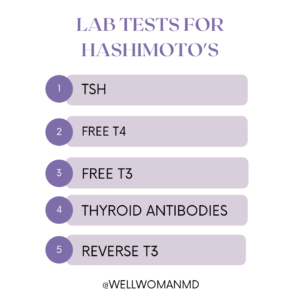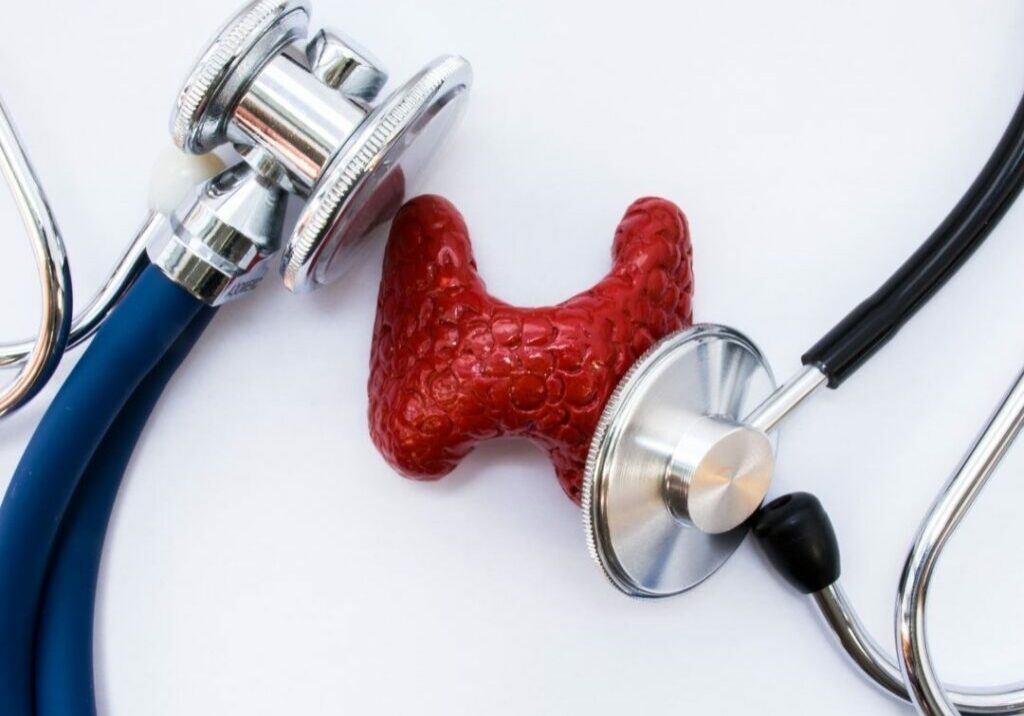What is Hashimoto’s Thyroiditis?
Hashimoto’s thyroiditis is an autoimmune disease that, over time, destroys thyroid tissue. It is the most common cause of hypothyroidism in the U.S. It is ten times more common among women than men.
However… many people with hypothyroidism don’t know that they have Hashimoto’s? Say what… it’s true.
Because the list of symptoms is long and many of these symptoms mimic many other conditions.
In individuals with Hashimoto’s, the body produces antithyroid antibodies that destroy thyroid gland cells, resulting in decreased production of thyroid hormones. Thyroid hormones play a key role in energy metabolism and regulating several vital body functions, such as growth and development, heart rate, body weight, body temperature, and menstrual cycles.
Those diagnosed with Hashimoto’s hypothyroidism will likely be treated with a thyroid medication called Levothyroxine. Still, not much will be done to address the autoimmune component of the disease.
As Mark Hyman says, it is an autoimmune disease that affects the thyroid.
Fortunately, there are solutions, and autoimmune disease is a condition I regularly treat in my medical practice.
And as a thyroid patient myself, I can attest to the importance of addressing thyroid hormone replacement and the immune system component of this disease.
Diagnosis of Hashimoto’s Thyroiditis
If I suspect Hashimoto’s or a thyroid problem in a patient, I order the following lab work:
- TSH-this is an indirect (but specific) measure of thyroid function. Essentially TSH measures how the pituitary gland (in the brain) communicates with the thyroid. When high, it is indicative of hypothyroidism.
- Free T4-T4 and T3 are your body’s main thyroid hormones. Free T4 measures the thyroid gland’s bioavailable (unbound) hormone. Low T4 is a marker of low thyroid function.
- Free T3-T4 is converted to T3 in the peripheral tissues. Free T3 is also known as the “gas.” A low level of T3 can indicate low thyroid function or just a problem with the conversion. Conversion issues are pretty common with my patients, especially those with a lot of stress, inflammation, or a high toxic burden.
- Reverse T3-some T4 is also converted to reverse T3. Reverse T3 is also known as the “brakes.” High levels of reverse T3 can be responsible for symptoms of hypothyroidism, since it competes with free T3 for cell receptor sites. However, this is generally not a problem with the thyroid but rather a sign of a systemic issue like chronic inflammation.
- Thyroid Peroxidase (TPO) and Thyroglobulin (TG) antibodies-In addition, I look for thyroid antibodies that can indicate underlying Hashimoto’s disease. Hashimoto’s is sometimes present even with normal thyroid function.

Integrative Approach to Hashimoto’s
When you work with an integrative practitioner, we want to understand what drives your symptoms. So, we can create a personalized plan unique to you to reverse those symptoms and get you back to feeling like you again.
5 Step Approach to Treating Hashimoto’s
1. Test for the cause: infection, toxins, heavy metals, adrenals, nutrients.
2. Right Medication for you.
3. Diet that decreases inflammation in the gut and promotes gut health.
4. Lifestyle: eliminate toxins, exercise, and manage stress.
5. Supplements that support the thyroid
STEP 1: Test
I always order a full thyroid panel for my patients. I want to see if the medication they are on is the correct medication. It also helps me gauge their antibody levels before starting a more holistic treatment.
Sometimes we need more advanced hormone testing to look for the following:
Vibrant wellness labs have the top 4 tests I use.
MOLD (mycotoxin),
Nutrient Deficiencies,
Heavy Metals
Inflammation in the GUT
Genetics to understand where the breakdown is occurring.

STEP 2: Medication:
I prescribe thyroid medications like Levothyroxine or desiccated thyroid hormone to replace what your thyroid cannot make. But I ensure we are using the proper thyroid replacement medication based on your lab work. You may be ok with T4 replacement alone or need both T4 and T3; it depends on what your body needs.
Step 3: DIET
- Eliminate food triggers like gluten, dairy, soy, and corn, and fix your leaky gut
- Eat nutrient-dense foods that have selenium, zinc, magnesium, iron and B vitamins
- Increase consumption of Omega 3 rich foods
- Nourish the gut with probiotics/prebiotics/fiber
- Avoid excess mercury, and heavy metals IN FOOD
Step 4: Lifestyle Shifts
- Exercise that works for you, not against you
- Eliminate Toxins in beauty products, cleaners
- Eliminate heavy metal exposure
- Stress Management techniques and adding adaptogens
Step 5: Supplements and Herbs
There are several supplements I recommend to my patients. But this needs to be personalized so you need to discuss any medications with your doctor. Here are the top supplements I recommend.
- A high-quality multivitamin with Vitamin A, B-vitamins-both B1 and B12, Iron, Selenium, and Zinc
- Probiotics, typically MegaSporeBiotic or any spore probiotic.
- Apoptogenic herbs like Ashwagandha.
- Vitamin D, depending on serum levels
Are you interested in learning more?
As I mentioned earlier, thyroid health issues caused me infertility until I realized what was wrong. But even then, I did not truly feel better until I took an integrative approach and changed my diet and lifestyle. So, whether you have Hashimoto’s or suspect you may, I’d love to help. Reach out to me and let’s get started on the road back to reclaim your health.
During a consultation, we’ll figure out:
- If your thyroid function is outside of the optimal range
- And if so – which medication is right for you (i.e. is Synthroid best, or might Armour be a better option?)
- The root cause of thyroid antibodies and autoimmunity through advanced testing.
- How to address your health concerns through personalized nutrition, lifestyle, and supplement recommendations
Contact my office to learn more!
Article Resources:
- Hashimoto’s disease. Mayo Clinic. 2020.
- Bland J. Nutritional Endocrinology, Normalizing Hypothalamus-Pituitary-Thyroid Axis Function, 2002 Seminar Series Syllabus.
- Gaby AR. Sub-laboratory hypothyroidism and the empirical use of Armour thyroid. Altern Med Rev. 2004 Jun; 9( 2): 157- 179.







